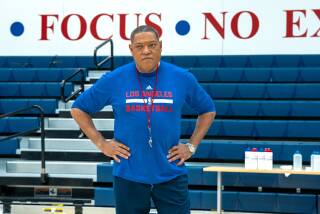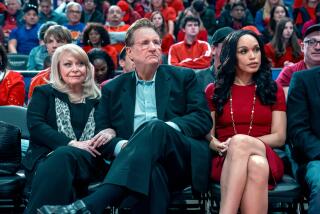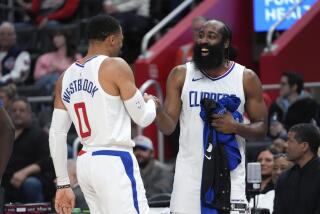Winning the Pooh : Former UCLA Standout Says He Finally Feels at Home in the NBA With Clippers
Guard Pooh Richardson sat behind the bench dressed in street clothes as the Indiana Pacers came within one game of reaching the NBA finals last season.
Richardson, who had sat out the final 13 games of the regular season after suffering a separated right shoulder, wasn’t activated for the playoffs, although he had recovered.
Coach Larry Brown, reluctant to upset the team’s chemistry by activating Richardson after the Pacers had won their last eight regular-season games, played point guards Haywoode Workman and Vern Flemming as the Pacers extended the New York Knicks to seven games in the Eastern Conference finals.
“It’s hard watching if you’re hurt, but it’s even twice as hard watching if
you’re healthy and ready to play and you’re not playing,” Richardson said.
Why didn’t the Pacers activate him?
“Knowing Coach Brown, you never know,” Richardson said. “I never received a straight answer myself. “Honestly, I didn’t really care. What I wanted to do was just be activated and be there if they needed me. I didn’t care if they started me or played me 10 minutes because there was a chance that we could have gone to the (finals).”
Brown said it was a case of bad timing.
“When he got hurt, Haywoode and Vern stepped forward and played great,” Brown said. “We never could get him healthy enough to play and our team started to play well. There were a lot of factors. We got more comfortable with each other. It wasn’t so much Pooh, it was where our team was going at that time.
“I read a lot of stuff about my relationship with Pooh. Hey, I didn’t feel any problems with Pooh.
And I still believe he’s terrific and has terrific skills, but it was just an unfortunate situation in terms of timing. It was just a bad time to get hurt.”
Even so, when the Pacers voted on splitting playoff money, they didn’t vote him a full share. Forward Malik Sealy, who also sat out the playoffs even though he, too, was able to play, received a full share.
“As far as the money’s concerned, it was no big issue,” Richardson said. “My season was over with anyway. Whatever I received, I looked at as gravy. If you’re not playing, there’s no reason to expect anything. It was fair. I’m not bitter.”
Richardson said he met with Pacer General Manager Donnie Walsh and Brown after the season and asked to be traded. The Pacers sent him to the Clippers, along with Sealy and the rights to Nebraska forward Eric Piatkowski, the 15th player selected in the draft, for disgruntled point guard Mark Jackson and the rights to Louisville guard Greg Minor, the 25th player drafted.
Brown had a different version.
“He didn’t ask to be traded. That’s a lot of baloney,” Brown said. “He had to be traded because it wouldn’t have been fair for him. He might have asked Donnie, but he didn’t ask me. But I don’t think that’s the case.
“We had a long-term commitment to Pooh, but we almost went to the championship with Haywoode and Vern and it would have been a very tough situation for him (this season). To me this is a trade that, hopefully, is going to help him, Malik and Mark.”
Richardson, who maintains that he always wanted to play for the Clippers, was elated.
“The only thing that can top (the trade) was when I was drafted,” Richardson said. “That’s the only thing that can top the fact that I was sent to L.A. and to the Clippers.
“Everyone can say what they want, but I always wanted to play for the Clippers. Nothing against the Lakers, but they always had everything. The Clippers always had a lot of talent, but I think a lot of people misjudged them.”
The trade has revitalized Richardson, who played at UCLA and said he would have preferred to remain here for his NBA career. Richardson, 6 feet 1 and 180 pounds, reported for training camp in excellent shape after working out for five hours a day last summer.
He had hoped the Clippers would draft him in 1989 but, with their second pick, selected Duke’s Danny Ferry instead. Richardson went to the Minnesota Timberwolves, where he spent three seasons.
“I was realistic,” Richardson said. “I knew I wasn’t the second pick in the draft, but I was hoping that some kind of trade would happen and I would be here. When I got to Minnesota I was going to play hard and do the best I could, but my heart was really back in L.A.”
The Clippers considered trading for Richardson in 1992, but the deal never materialized and Minnesota sent Richardson and forward Sam Mitchell to Indiana for forward Chuck Person and guard Michael Williams before the start of the 1992 season.
“Honestly, I thought I had no business being in Indiana,” Richardson said. “I thought I was coming from Minnesota straight here. Too bad this isn’t like a regular job where you can file for a transfer wherever you want to go, or I would have done it earlier.”
Richardson clashed with former Pacer Coach Bob Hill during his first season in Indiana, and his scoring average fell from 16.5 to 10.4, his assist average from 8.4 to 7.7.
When Brown replaced Hill last season, there were reports that Richardson and Brown clashed. Richardson says he got along with Brown, but disliked living in Indianapolis.
“I got along well with Larry,” Richardson said. “I never had problems with Larry. I grew up in the big city (Philadelphia) and I went to school in the big city (Los Angeles) and it was hard coming to a small spot like Indiana.
“Everybody knows Coach Brown. He wants you to get better, so he’s always on you. You just have to be tough mentally.”
Brown agreed.
“I got along with him,” Brown said. “When I got the job, based on his ability, I thought he’d be a tremendous player for us. We didn’t win, but it wasn’t because of his play.”
Richardson, whose scoring average has declined for the last three seasons after a career-high 17.1 points in 1990-91, hopes to revive his career here.
Plagued by injuries last season, he had career lows in scoring average, 10; games played, 37; shooting percentage, 45.2; rebounds, 3.0, and assists, 6.4.
“It would be easy for me to go out and play a lot of minutes and score a lot of points and say that I’m proving my point,” Richardson said. “But I think that’s not fair to the organization.
“One thing I don’t like about this league is that they’ll say bad things about someone . . . and all of a sudden it becomes the gospel. If they say bad things about (the Clippers), all of a sudden it travels like it’s the truth.”
Although players were quick to criticize the Clippers last season because of contract disputes, the atmosphere has been tranquil at training camp being conducted by new Coach Bill Fitch at UC Irvine.
“If you’ve got a bunch of guys who don’t want to be here, let them go,” Richardson said. “I’m not a general manager and I don’t own this team, I’m just a player who’s committed to playing here. But I wouldn’t pay guys millions of dollars to run around and talk bad about the organization.”
Fitch, the guard’s fifth coach in six years, believes Richardson, 28, is at a crucial point in his career.
“He’s been just about everywhere you can be,” Fitch said. “He’s home, so where do you go if you get kicked out of home? And he knows that. He’s had a lot of stops for a young career, and playing (point guard), you have to settle down somewhere and run some team some time for a longer period of time.”
More to Read
Get our high school sports newsletter
Prep Rally is devoted to the SoCal high school sports experience, bringing you scores, stories and a behind-the-scenes look at what makes prep sports so popular.
You may occasionally receive promotional content from the Los Angeles Times.







